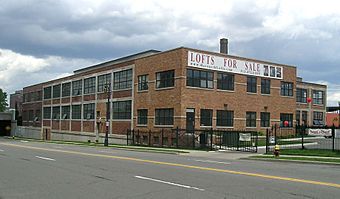Crescent Brass and Pin Company Building facts for kids
Quick facts for kids |
|
|
Crescent Brass and Pin Company Building
|
|
 |
|
| Location | 5766 Trumbull St., Detroit, Michigan |
|---|---|
| Built | 1905 |
| Architect | Rogers and MacFarlane |
| NRHP reference No. | 03000067 |
| Added to NRHP | March 3, 2003 |
The Crescent Brass and Pin Company Building is a historic building in Detroit, Michigan. You can find it at 5766 Trumbull Street. It was added to the National Register of Historic Places in 2003. Today, it is known as the Research Lofts on Trumbull. It has been turned into modern homes.
Contents
History of the Building
How It Started
In 1886, a man named Alvin W. Needham invented a machine. This machine could make nails for cigar boxes. He got help and money from two brothers, John and William Gray. The Gray brothers had a business that built carriages.
The three men started a company called Empire Wire Nail Company. They made nails in John Gray's barn on Trumbull Street. Soon, Needham invented another machine. This one made "chaplets." Chaplets are small metal parts used in factories. They help hold things in place when making metal objects. Making chaplets became more successful than making nails. So, the company slowly started making more chaplets.
Growing and Changing
The business stayed in John Gray's barn until 1897. Then, it moved to a building on Adams Street. This building also housed Gray's carriage business. At the same time, Needham sold his share of the company to the Gray brothers. The company's name changed to Crescent Machine Co.
The company grew a lot from there. Soon, the Gray brothers worked full-time at Crescent. By 1905, Crescent needed more space than the Adams Street building offered. So, they built a new building on Trumbull Street. This new building was just north of John Gray's property. A few years later, they started making plumbing supplies too. The company then changed its name again to Crescent Brass & Pin Company.
A New Life for the Building
Over the years, the company made many different products. But nails and chaplets remained their main items. Crescent stayed at the Trumbull Street location until 1958. Due to challenges with workers, the company moved to Americus, Georgia. There, it became Simplex Nails, Inc.
Some manufacturing work later returned to the Detroit plant. However, the business in Detroit never fully recovered. Crescent stopped making things in Detroit in 1984. They gave the building to the Society of Saint Vincent de Paul.
In September 2001, a company called 5766 Trumbull LLC bought the building. They planned to turn the old factory into affordable apartments. Construction began in the spring of 2005. A third floor was added to the original two-story building. The whole building was updated to create 35 loft apartments. In October 2006, the first new resident moved into the renovated building. The building is now called Research Lofts on Trumbull.
Building Design and Construction
How the Building Was Made
The original building was designed in 1905. It was created by the Detroit architectural firm Rogers and MacFarlane. This building is a great example of "timber frame mill construction." This style was very popular in Michigan in the early 1900s. It used large wooden posts and beams. This created big open spaces inside. These spaces were easy to adapt for large machines.
The huge posts and visible floor joists were built in a special way. This design helped to slow down the spread of fire. It also made fires easier to spot. This was because there were no hidden spaces where fire could spread unseen.
Building Changes Over Time
The building was made larger in several steps. The first addition was in 1916. More additions followed in 1917, 1924, and the early 1950s. These later parts of the building were built using "reinforced concrete." This shows how industrial building design changed in the early 20th century.

